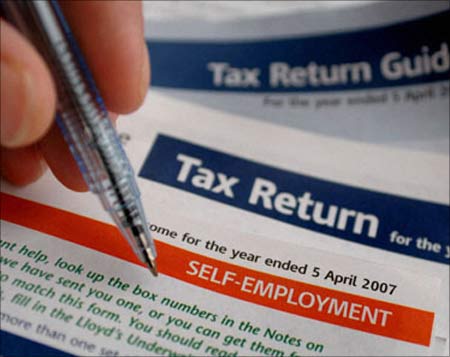 | « Back to article | Print this article |
Tax-saving investment can be done within calendar month
Taxpayers looking to save taxes on long-term capital gains, but not willing to invest in a house property, are eligible to invest the capital gains in specified bonds of public sector undertakings like National Highway Authority of India and Rural Electrification Corporation and save capital gains taxes under section 54EC of the Income Tax Act.
These bonds offer a lock-in period of three years beyond which they can be liquidated.
The interest rate offered by the bonds is approximately 6 per cent and the interest earned on the bonds is taxable.
These bonds are a good option available for taxpayers to save capital gains taxes without committing money over the long term.
The section, however, restricts the amount of exemption to Rs 50 lakh invested in these bonds per financial year.
Section 54EC of the I-T Act provides that where the long-term capital gain is invested by a taxpayer, at any time within a period of six months after the date of transfer of the capital asset, in the specified bonds, then the resulting capital gains will be exempt to the extent of amount invested in the bonds.
Click NEXT to read further. . .
Tax-saving investment can be done within calendar month
Recently, in a case that came up before the Special Bench of Income Tax Appellate Tribunal, Ahmedabad, a taxpayer had sold his flat for a total consideration of Rs 64 lakh (Rs 6.4 million).
In his return of income, the taxpayer had computed the capital gains as nil.
The basis for the nil capital gains was that the gain was stated to be approximately Rs 56 lakh (Rs 5.6 million); however, he had made the investment in NHAI bonds to the tune of Rs 45 lakh (Rs 4.5 million) and claimed a deduction under section 54EC of the Act.
The balance gains of Rs 12 lakh (Rs 1.2 million) were invested in a capital gain account scheme.
During the course of assessment proceedings, the tax officer observed that the investment in NHAI bonds of Rs 45 lakh for the purpose of claim of deduction u/s 54EC was purchased on December 17, 2008 as per the entry in the bank pass book.
Click NEXT to read further. . .
Tax-saving investment can be done within calendar month
The tax officer further observed that the sale document was registered on June 10, 2008 and hence the taxpayer was required to purchase the bonds within six months of the date of registration.
The taxpayer informed the tax officer that the last date of expiry of six months from the date of transfer of the house property was December 10, 2008; however, he had tendered the cheque along with the application for the bonds on December 8, 2008 to the bank, which was within the period of six months from the date of sale.
The taxpayer put up another stand that the time limit for investment in bonds is available till the end of month of December 2008.
But tax officer denied the exemption to the taxpayer in the assessment order.
Click NEXT to read further. . .
Tax-saving investment can be done within calendar month
The taxpayer then preferred an appeal with first appellate authority, where he submitted that as the application was submitted to the bank along with the cheque before the last day of the expiry of six months from the date of sale, he was entitled to the deduction u/s 54EC.
However, as the date and time stamp on the application copy was not clear, the appellate authority could not ascertain its validity.
Hence, the authority too rejected the taxpayer’s claim.
When the matter came up before the Special Bench, the taxpayer argued that the term ‘month’ as used in the section 54EC has not been defined in the Act.
Consequently, the same should be interpreted as per the definition given under the General Clauses Act where the term ‘month’ is reckoned as per the British calendar.
Click NEXT to read further. . .
Tax-saving investment can be done within calendar month
The tax officers argued that in respect of the computation of period for the purpose of prescribing a limitation under the Act, the wordings are unambiguous.
As per the language, a particular date is to be taken into account for the purpose of calculation of days/months.
In view of the same, there was no necessity to take the help of ‘General Clauses Act’. Therefore, the tax officers claimed that for the purpose of section 54EC, a month is a period from specified date in a month to the date numerically corresponding to the date in the following months less one.
The Special Bench observed that the crux of the issue at hand is whether for the purposes of section 54EC, the period of investment should be calculated as six months after the date of transfer or to be reckoned as 180 days from the date of transfer.
Click NEXT to read further. . .
Tax-saving investment can be done within calendar month
The Bench observed that the phrase ‘within a period of six months after the date of transfer’ has not been used in the Act for any other provisions and is used only for the purpose of investment in certain specified assets in respect of computation of capital gains.
It observed that the Act has provided an incentive to a taxpayer, who has earned long-term capital gains, to get relief if the gains are invested in any specified assets, provided the investment has been made at any time within a period of six months after the date of such transfer.
Click NEXT to read further. . .
Tax-saving investment can be done within calendar month
The Bench relied on other judgements on the interpretation of the term month and it was observed that in majority of the cases, the expression six months means six calendar months and not 180 days.
In the absence of the definition of the word ‘month’ in the Act, the one given in the General Clauses Act shall prevail.
As there was no dispute that the taxpayer had invested the money in capital gains bonds, the claim that the investment was done with a delay of few days does not support the purpose of the incentive offered by the section.
Accordingly, the Special Bench allowed the taxpayer’s claim.
Arvind A Rao is a chartered accountant








